Along the process of booking a ticket, one variable that’s always a bit of a black hole is fuel surcharges: which programs are guilty of them, which airlines levy them, which countries regulate them, and how do we predict the cost?
Fuel surcharges are made all the more confusing by how arbitrary they are – there’s really no logical explanation for which programs levy them, and if so, how much. And yet, if you aren’t paying attention, you could easily map out a business class or First Class redemption but find yourself paying $1,000+ (CAD) in surcharges at the end of it.
In this guide, we’ll walk through the treatment of fuel surcharges among the major award programs to help you understand how to avoid the expensive traps that the airlines have set for you and extract the best value out of your miles.
In This Post
What Are Fuel Surcharges?
On award tickets, we generally pay two types of fees: government-imposed taxes and fuel surcharges (also known as carrier-imposed surcharges). The taxes usually add up about $100–150 (CAD) at most, and there’s no way to avoid this fee (other than flying to/from a different country).
Fuel surcharges, on the other hand, can cost any amount depending on the airline and loyalty program in question, and to be completely frank, they’re really nothing short of a shameless cash-grab.
While they were ostensibly first introduced by airlines as a protective measure during times of high oil prices, these days they’ve transformed into an easy way for airlines to collect pocket change when their members redeem miles for “free” flights. After all, many passengers might not spend the time to learn how to avoid them and will likely pay up when it’s the first option that pops up on the search engine.
But of course, we know better than that, so let’s begin with a few general pointers on avoiding fuel surcharges before delving into the specific details of the major award programs.
General Rules on Avoiding Fuel Surcharges
One of the easiest ways to take fuel surcharges off the table entirely is to pay attention to which country you’re originating from (or in some cases, travelling to).
Countries like New Zealand have imposed strong regulations on fuel surcharges, so when flying out of these countries, it won’t matter which frequent flyer program you’re using or which airlines you choose. The governments and aviation authorities of these countries regulate the fuel surcharge, either limiting the amount or banning it altogether, and airlines must follow these rules.
For example, many of us know that British Airways levies fuel surcharges on award bookings and cash bookings. In this example, we see around $423 (CAD) in carrier-imposed surcharges, as well as taxes and fees, for a flight from London to Hong Kong.

Start in Hong Kong, however, and that surcharge drops significantly, bringing the total amount of taxes down to well within the realm of reason.

It might even be fun to choose airlines that would normally levy high fuel surcharges when departing one of these countries, in order to experience an onboard product that you’d likely not pay for otherwise.
Further to this example, avoid departing from London, especially if you’re flying in a premium cabin. While this doesn’t technically count as a fuel surcharge, the UK charges $300+ of Air Passenger Duty (APD) per adult on a business class or First Class award ticket, and this fee can easily be avoided by flying in and out of a different European city and using Avios to hop over to London (if you don’t mind the slight inconvenience of a few more hours of travel time).
Finally, keep in mind that British Airways is an airline that’s notorious for hitting you with high fuel surcharges no matter which type of miles you’re using to redeem points, including its own Avios program, Alaska Airlines Mileage Plan, and Cathay Pacific Asia Miles – you’ll almost never be able to avoid the surcharge on BA flights, unless you make use of one of the countries with fuel surcharge regulations as discussed above.
British Airways recently made it possible to pay more in Avios and less in cash on award bookings with “Reward Flight Saver” bookings on long-haul routes. If you don’t mind spending more Avios, you can benefit from lower costs on direct flights with British Airways when the fuel surcharges would have otherwise made it prohibitively expensive.
Aeroplan
Many Star Alliance airlines levy hefty carrier-imposed surcharges on award bookings. The most notorious offenders are Lufthansa and Austrian Airlines; however, depending on the loyalty program you book with, you may be able to avoid paying them altogether.
Luckily, Aeroplan is one of the few loyalty programs that doesn’t pass along carrier-imposed surcharges on award bookings. This is one of the program’s many stand-out features, as it allows you to fly with a host of carriers without paying through the roof in taxes, fees, and surcharges.
If you book an Aeroplan reward with a partner airline, or any airline that isn’t Air Canada, you’ll be charged a $39 (CAD) partner booking fee. Note that this fee is charged by Aeroplan and not the airlines themselves, so it’s not a carrier-imposed surcharge.
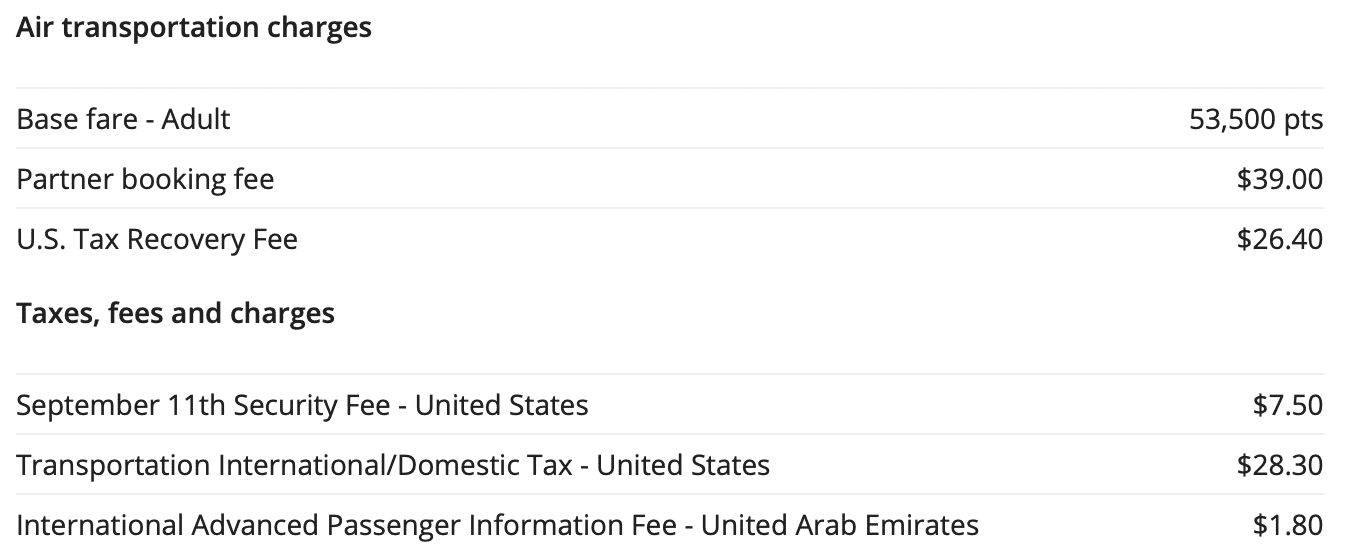
Aside from the government-imposed taxes and fees that everyone has to pay, as well as a partner booking fee on non-Air Canada flights, you won’t be subjected to any carrier-imposed surcharges on Aeroplan bookings.
Expect to pay as little as $7 (CAD) for a flight with United departing from the United States, and around $100–150 (CAD) for long-haul international bookings, which of course depends on the airports you travel to, through, and from.
Alaska Airlines Mileage Plan
Alaska Airlines Mileage Plan is pretty favourable in the sense that most airlines do not levy fuel surcharges when using Alaska miles.
Alaska imposes minor fuel surcharges on Hainan Airlines (about $200 (USD) on a one-way journey) and Icelandair (about $95 (USD) on a one-way journey), as well as much more significant fuel surcharges on British Airways. However, keep in mind that none of those airlines represent the best sweet spots for using Alaska miles.

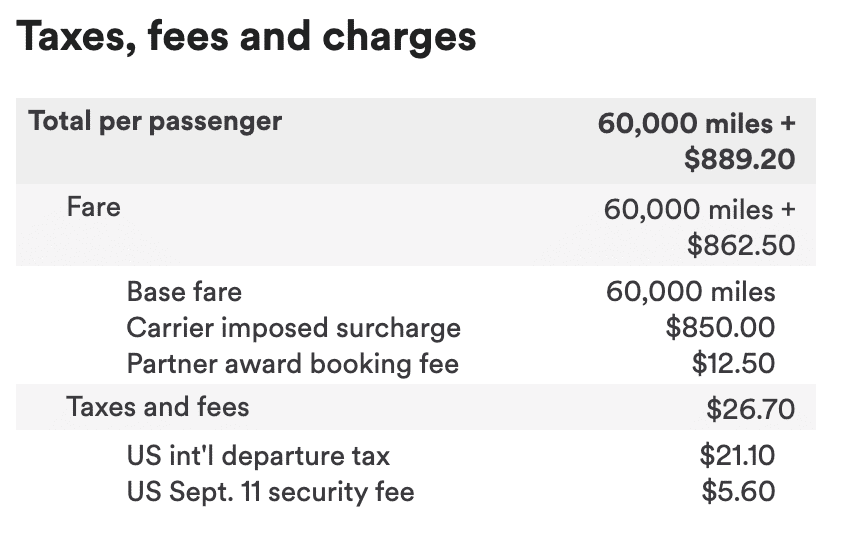
Rather, most travellers prefer to redeem Alaska miles on Cathay Pacific and Japan Airlines, amongst other airlines, which all come at a much better price.
Therefore, for the most part, you can consider Alaska Airlines Mileage Plan as a low-to-no surcharge program, given that we always want to redeem our miles for the best possible value, and that definitely isn’t with British Airways. Meanwhile, the minor fuel surcharges on Hainan and Icelandair are quite palatable, given that the redemption rates are favourable to start with.
British Airways Avios
As a general rule of thumb, British Airways Avios levies fuel surcharges on most of their partners, but these surcharges are in the acceptable range for the most part. For example, Japan Airlines, Cathay Pacific, and Iberia all levy fuel surcharges in the standard range for award bookings.
The major airlines with high fuel surcharges using Avios are British Airways themselves, as well as Qatar Airways. A Qatar Airways flight involving countries that don’t regulate fuel surcharges comes to about $212.30 (CAD), with $118.40 (CAD) coming from carrier-imposed surcharges.
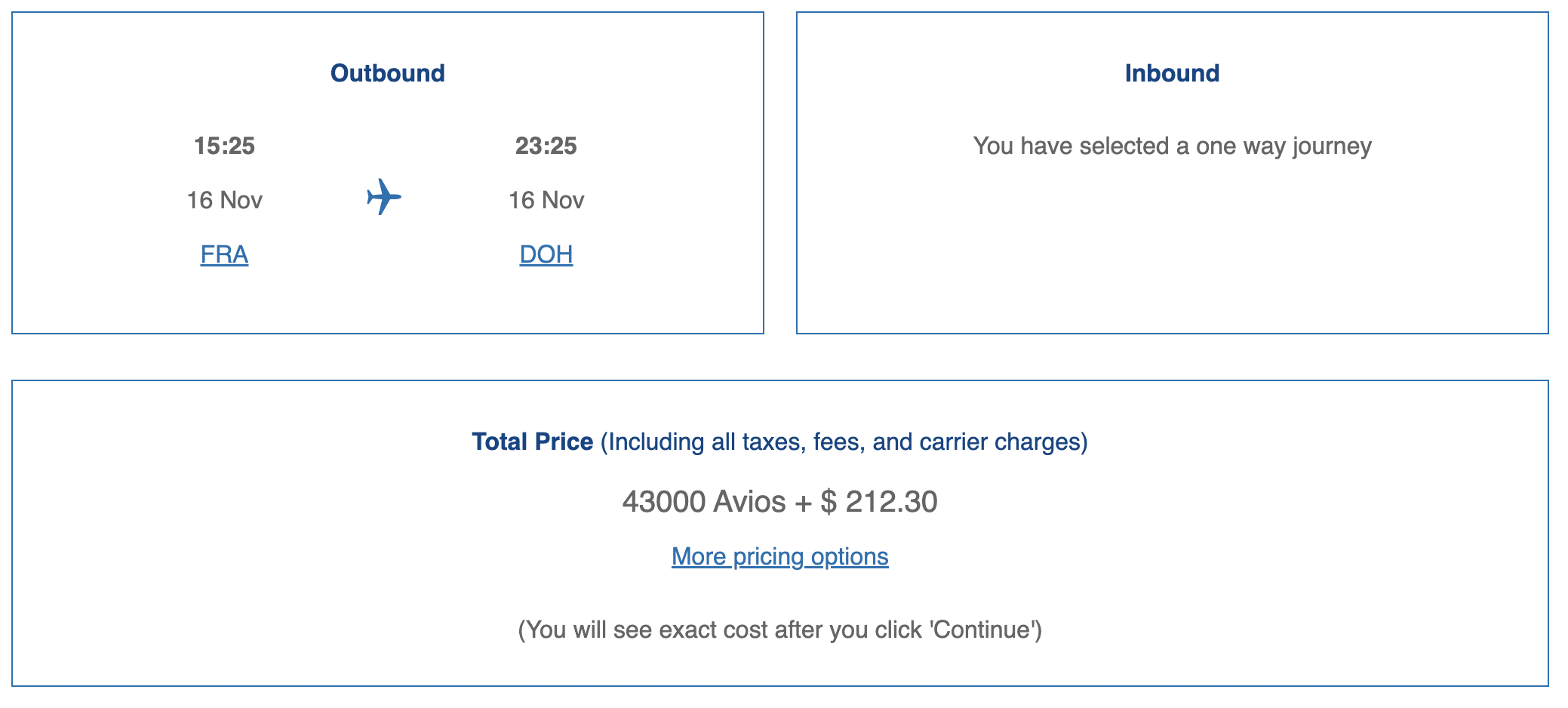

Taking advantage of Hong Kong’s regulations, however, brings the total taxes and fees down to a mere $157.50 (CAD), and of that, only $63.80 (CAD) is from carrier-imposed surcharges.
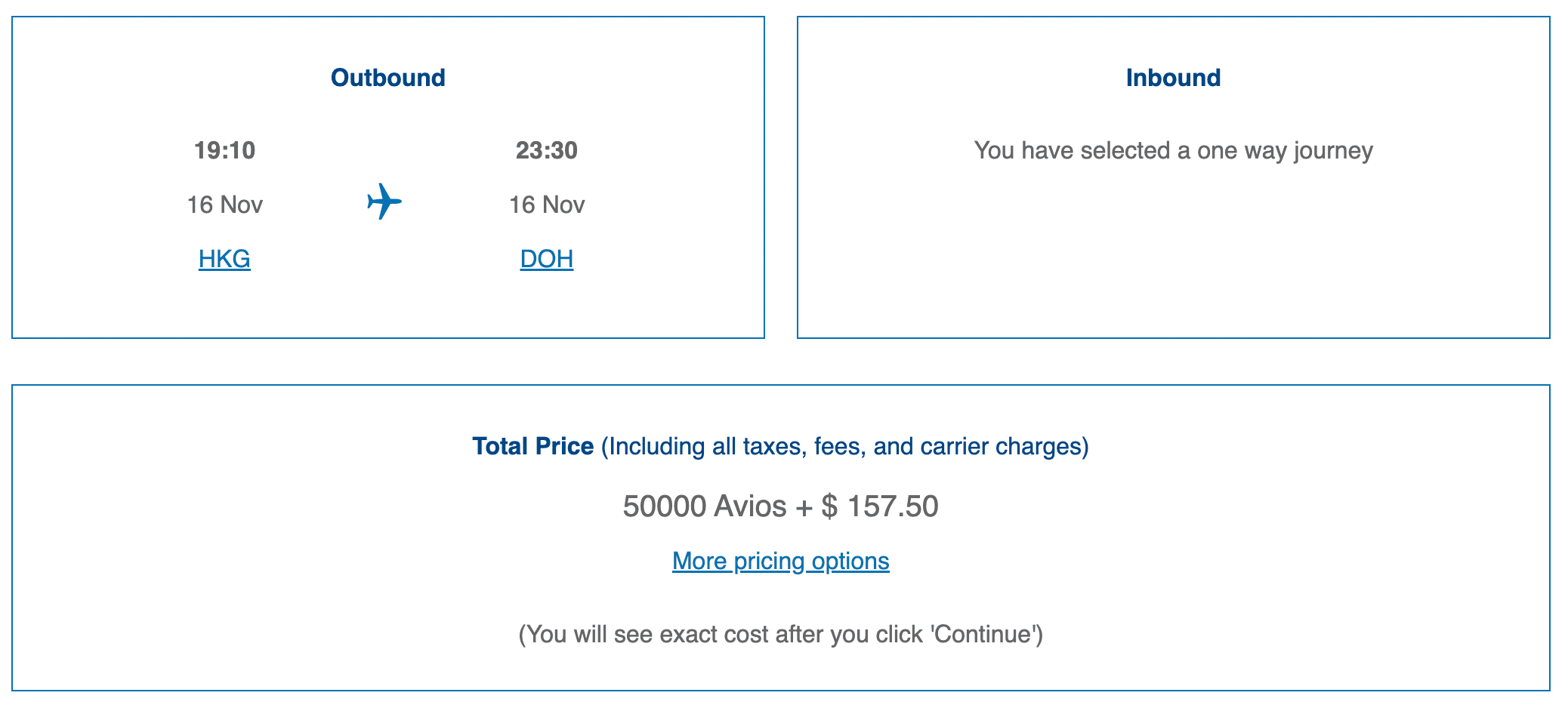

One of the most common use of Avios are for short-haul flights within Europe, Asia, and Australia. These flights usually come with negligible amounts of fuel surcharges, which makes short-haul hops around the world such a compelling sweet spot.
However, it’s still worth checking out the cash price of a ticket, since even $41 (CAD) of taxes and fees might make for a poor redemption value compared to a $40 (CAD) ticket on EasyJet or AirAsia.

Something else to consider is the Avios Oneworld multi-carrier chart. Since piecing together a custom itinerary with numerous carriers involves quite a bit of legwork, you’ll want to be strategic about which country you’re departing from to begin with, in an effort to lower the burden of carrier-imposed surcharges.
Recently, one member of the Prince of Travel Discord community priced out an itinerary involving Qatar Airways Qsuites and Japan Airlines business class. For a trip with a routing of YUL–DOH–DEL–HND/NRT–BOS, the total amount of taxes and fees, including carrier-imposed surcharges, was a whopping $1,412.75 (CAD).
Meanwhile, one member of the Prince of Travel team recently completed a multi-carrier reward booking that originated in Australia. For an itinerary that consisted of flights with Japan Airlines First Class, Japan Airlines business class, American Airlines First Class, Finnair business class, Qatar Airways Qsuites, Qatar Airways First Class, and Malaysia Airlines, the total amount of taxes and fees came to $1,337 (CAD).
Overall, taxes and fees on a Oneworld multi-carrier award are generally quite high (you can expect to pay at least $500 (CAD) in exchange for the incredible value to be unlocked in this award chart), only to rise higher with more complex bookings. By originating in a country that regulates carrier-imposed surcharges, you can lower the cost burden and maximize the value from your miles.
Anyone who’s looking to book a Oneworld multi-carrier award should call British Airways and price out the taxes and fees beforehand – you should be able to do this on the phone without actually making a booking.
Cathay Pacific Asia Miles
Cathay Pacific Asia Miles is known for its generous distance-based award chart and the capacity for fun one-way flights, and the fuel surcharge situation virtually mirrors that of its fellow Oneworld loyalty program British Airways Avios. Flights on British Airways and Qatar Airways tend to incur very high fees, whereas other airlines levy a much more moderate amount.
For a Qatar Airways flight departing from Montreal, you can expect to pay just over $500 (CAD) in surcharges per person, which is probably still pretty good value for the excellent Qatar Airways Qsuites product, but definitely isn’t ideal.

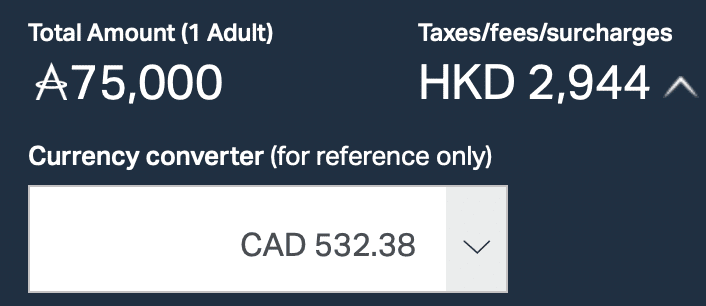
Instead, consider originating in a jurisdiction with fuel surcharge regulations, such as Hong Kong, which brings the amount down to a much more palatable range.

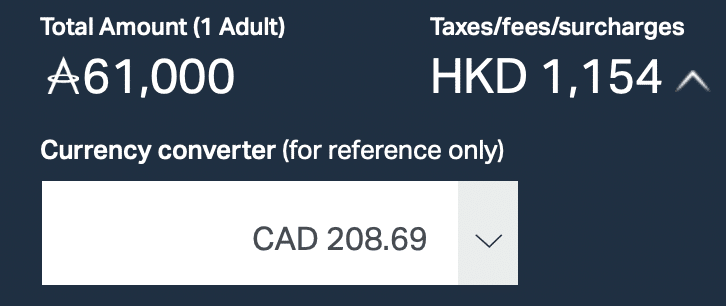
For the many outstanding Asia Miles sweet spots involving Cathay Pacific, Japan Airlines, and Qantas, the surcharges typically come in at a not-insignificant but reasonable range of $300 (CAD) for a one-way trip involving two segments.
Another potentially valuable Asia Miles redemption is the Royal Jordanian service between Montreal and Amman, which you could then combine with a flight to another Royal Jordanian destination after a stopover in Amman. The surcharges here are slightly more expensive, but not nearly as punitive as British Airways and Qatar Airways.
Note that Asia Miles sometimes makes it difficult to determine the fuel surcharge unless you have enough miles in your account to make the booking.
In particular, if you can price out your journey using the one-way or round-trip search tools, then the website can successfully calculate the surcharge that you’d have to pay. But if you’re using the multi-city search tool to piece together a one-way redemption, then you’ll need to have the full mileage amount in your account before you can see the fuel surcharges.
Advanced: Predicting Fuel Surcharges with ITA Matrix
If you’d like to get better at predicting how much you’d pay in fuel surcharges, then you’ll need to get familiar with the ITA Matrix tool, which is great for pricing out all the individual components of an airline ticket.
Let’s take an illustrated example, using the Qatar Airways flight from Montreal to Doha that we found on the Asia Miles search engine that we mentioned above.
To replicate this specific flight, we’ll choose the one-way search option and then fill in the origin and destination airports.
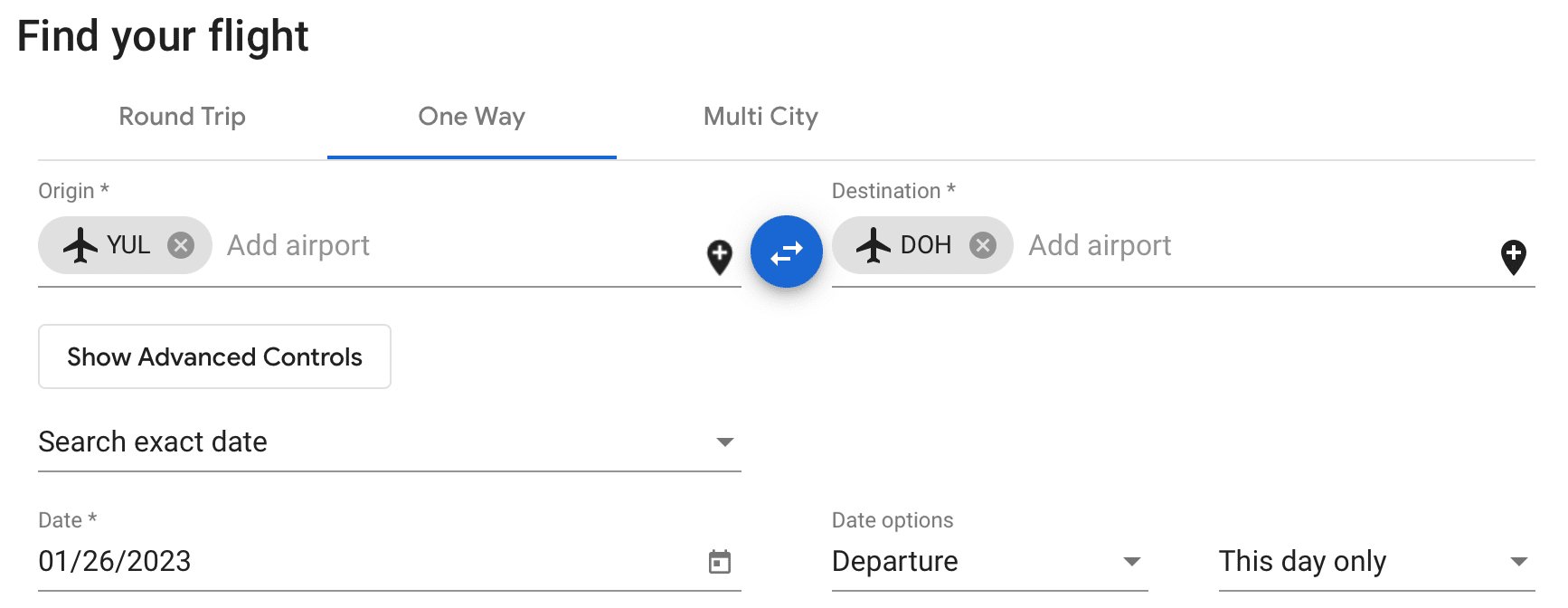
Then, select the date, number of passengers, and choose “business class or higher” for the class of service.
Clicking on the same 8:55pm departure as we found via Asia Miles, we get to see all the fare components that go into the price of the ticket.

Other than the base fare (which is denoted “Fare 1”), all of the other components could be charged as additional taxes and fees when redeeming miles for a ticket.
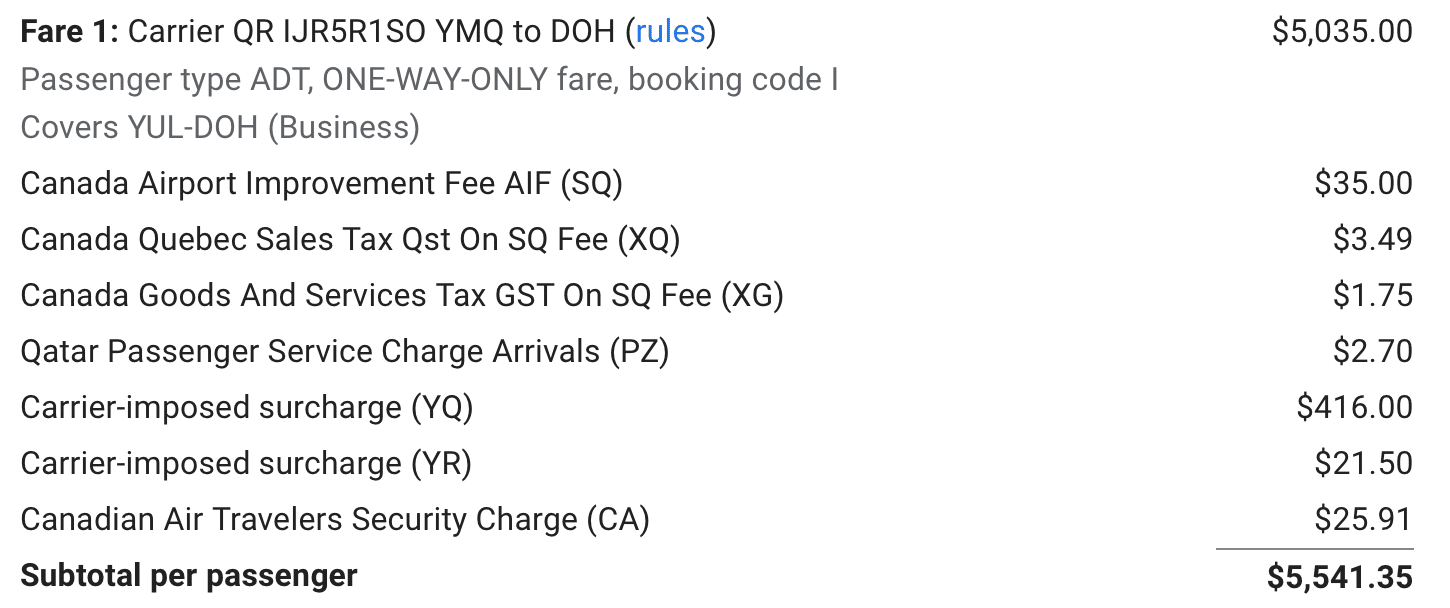
As we can see, both “YQ” and “YR” are carrier-imposed surcharges, and the total amount of taxes and fees, including the carrier-imposed surcharges, is $506.35 (CAD). This is roughly equal to the amount we saw on the Asia Miles website, with some room to account for currency conversions.
This was a simplified example, and you could of course use ITA Matrix to price out more complex multi-segment itineraries. However, the more complex your trip is, the less likely that the amounts displayed by ITA Matrix will be an exact match to what the award program ends up quoting you, due to the many multi-layered rules being applied to the fuel surcharge calculation.
Conclusion
Fuel surcharges are the ultimate buzzkill in award travel, and there’s nothing more annoying than discovering a compelling award chart sweet spot only to be hit with hundreds of dollars in fuel surcharges at the final step.
In general, though, every award program will levy fuel surcharges in some capacity, but will also offer some way of avoiding fuel surcharges, depending on the airlines and destinations chosen. As long as you understand which airlines are the biggest culprits and which countries have regulations in place, you can almost always keep your taxes and fees in a reasonable range and maximize the value of your miles.













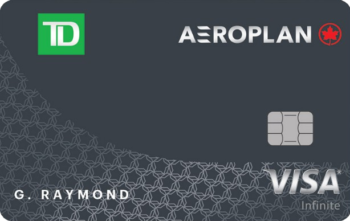



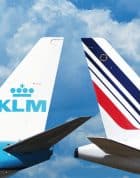
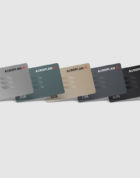

Not very practical, using your Cathay Pacific example, but how can someone in Montreal switch their starting point halfway across the globe to HK so as to avoid high surcharges? By buying separate fee tickets from Montreal to HK?
For example, if you’re planning a trip to Hong Kong, you could use Aeroplan (a no-surcharge program) for the outbound and Asia Miles / Avios for the return, where the Hong Kong origin would lower the surcharges for you.